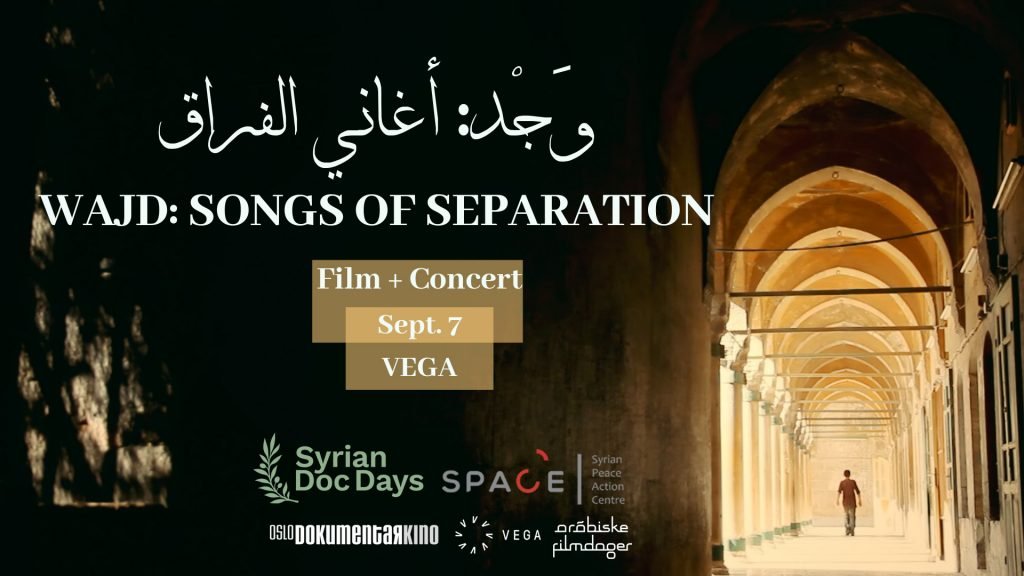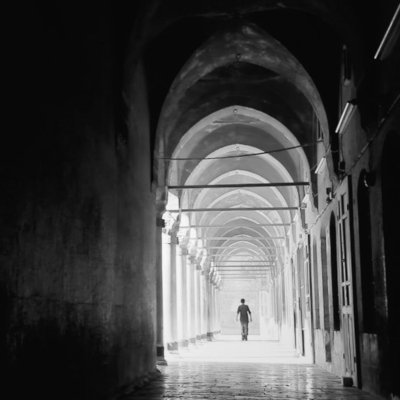
Filmen Wajd – Songs of Separation skildrer livet i eksil for tre syrere, bosatt i Tyrkia og Nederland. Alle tre er sterkt knyttet til Sufi-tradisjonen i musikk. Filmen forteller hvordan det å holde på musikken blir en måte å bevare sin identitet og kultur under vanskelige livsforhold.
Ibrahim, Abdulwahed, og Mohamad måtte alle flykte fra krigen i Syria.
Ibrahim var fascinert av Sufi-musikk allerede fra barndommen og startet et ensemble i Aleppo i tenårene. Gruppen måtte oppløses da konflikten startet og han flyttet etterhvert til Gaziantep i Tyrkia der han kunne fortsette å studere Sufi-musikk under sin lærer Sheikh Seif som også flyktet fra Aleppo.
Abdulwahed er musiker, født og oppvokst i Yarmouk, en palestinsk flyktningeleir i Damascus. Da opprøret mot regimet startet ble han først arrestert men senere sluppet fri og flyktet til Tyrkia der han også studerte musikk under Sheikh Seif og senere under en annen lærer i Istanbul.
Mohamad drev en cafe i Aleppo og var musiker på fritiden. Da revolusjonen startet ble han aktiv i humanitært arbeid, men flyktet med familien til Beirut da det ble for farlig å bli i Aleppo. Han reiste senere alene over middelhavet og søkte asyl i Nederland der han nå venter på å bli gjenforent med sin familie.
Regissør Amar Chebib startet med en intensjon om å lage en film om tradisjonell Sufi-musikk i Syria, i 2010. Da revolusjonen startet ble det umulig å fortsette prosjektet. Fem år senere ønsket han likevel å fullføre filmen men nå ble målet å undersøke hva eksiltilværelsen gjorde med hans tre hovedpersoner og om de klarte å bevare sitt forhold til musikken, løsrevet fra familie, venner og hjem.
Konsert etter filmen med Ibrahim Muslimani, Rihab Azar, Bakri Hemmami og Muhammad Fadel Kuj.
I samarbeid med Oslo Dokumentarkino, Vega Scene og Arabsike Filmdager
Tiltaket er delvis støttet økonomisk av Oslo kommune

SPACE, in collaboration with Oslo Dokumentarkino, Arabiske Filmdager, Vega Scene and Syrian Doc Days, invite you to a mystical evening at Vega Scene on Sept 7th. The evening starts with a film taking us on a timeless journey into the majestic world of music in Syria before the war. The film then chases the paths of three passionate musicians turned refugees as they rebuild their lives in exile. They resort to their love of Sufi music to find meaning in the aftermath of destruction and atrocity. Ibrahim, one of the musicians featured in the film, will join us later along with three world-renowned Syrian musicians in a Sufi-inspired concert.
PROGRAM
- 18.00 Wajd: Songs of Separation (Film)
- 19.30 Q&A with film director
- 20.00 Break
- 20.30 Songs of Separation (Concert)
Wajd: Songs of Separation (Film)
Inspired by the traditional sacred music of Syria, filmmaker Amar Chebib travelled to Damascus and Aleppo in 2010. Six months later the revolution began, escalating into a civil war and a humanitarian crisis. Touched by the harrowing experiences of the friends he made, Wajd transformed into the stories of three musicians turned refugees following them over five years.
Intimate footage of their daily lives weaved together with bittersweet musical performances, extremely rare Sufi ceremonies, and poetic imagery of a pre-war Syria that no longer exists. What unfolds is a cinematic meditation on loss, yearning, and faith.
Songs of Separation
Four prominent Syrian musicians are coming together from Turkey, the UK, Denmark as well as Norway to bring you a memorable evening of oriental rhythms fused with Sufi-inspired performance. The concert will revive the Sufi Levantine musical heritage, featuring Aleppine Qudud (Qudud Halabiya) and classical Arabic Muwashahat, a centuries-old genre spanning practices from Aleppo to Andulsia.
About the Musicians
Ibrahim Muslimani, now lives in Gaziantep, Turkey, was born in Aleppo to a family with a passion for Inshad, a form of Sufi choral singing. In 2003, Ibrahim joined Aleppine Inshad groups as a professional Daf player. In 2006, he started collecting Syrian musical heritage focusing on the orally passed-down, almost lost musical heritage and the rare Muwashahat, Qudud, Maqamat, rhythms and musical manuscripts and records. In 2012, he fled to Turkey where he further cultivated his passion for traditional music. He got a certificate in the essentials of classical Turkish music from the Directorate of Culture in Gaziantep,Turkey. Ibrahim is still studying the essentials of musical theories, rhythms and maqamat of the Ottoman Music, Oud playing and ethos of music with the master Mohammad Saif Addin Zein Al-Abedin. He is a co-founder and CEO of “Nefes Institution for Arts and Culture”.
Rihab Azar, now lives in the UK, was born in Homs, Syria to a musical family. Her father, luthier Samir Azar made her first oud and started teaching her when she was 7 years old. She continued her musical quest later at the Conservatoire of Damascus and was taught by masters of the oud in Syria. The influences at the Conservatoire included Azerbaijani, Arabic, Turkish and Western classical music. In 2014, She became the first woman oudist to perform accompanied by the Syrian National Orchestra for Arabic Music. Rihab was the oud player of the “Syrian Female Oriental Takht” from 2006 until 2015, the year in which she moved to the UK to study Music Education at University College London. Arts Council England recognised her as a musician of “Exceptional Promise” in December 2016.
Bakri Hemmami is a Syrian singer and musician based in Denmark, where he was invited to many cultural and academic events to talk about the Syrian traditional and Sufi music, and perform his art in front of the Danish Audience.
Muhammad Fadel Kuj, lives in Kristiansand, Norway, is a Syrian oriental performer and conductor. He studied classical music education and performing at Homs, where he was born. Muhammad lives in Norway since 2014 and studied musical conducting at University of Stavanger, he is working since 2017 with Norwegian choir association as a chief conductor for choir of Søgne.


